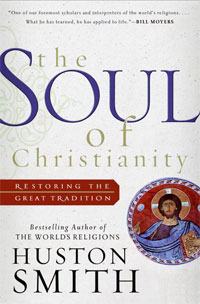Book Notes
 Huston Smith, The Soul of Christianity; Restoring the Great Tradition (San Francisco: HarperCollins, 2005), 176pp.
Huston Smith, The Soul of Christianity; Restoring the Great Tradition (San Francisco: HarperCollins, 2005), 176pp.
Born to Methodist missionary parents in rural China in 1919, Huston Smith has enjoyed a distinguished career as a scholar of world religions at Washington University, MIT, Syracuse, and Berkeley. His book The World's Religions, first published in 1958, has sold over 2 million copies as an introductory university textbook on the subject. Now in his late eighties, Smith describes himself as a "voice in the wilderness" decrying the corrosive forces of "secular modernity" which would marginalize religion. Thus his earlier book Why Religion Matters: The Fate of the Human Spirit in an Age of Disbelief (2002). His newest book begins with that prophetic warning but moves forward with a positive exposition of what he calls "The Great Tradition" of Christianity that enjoyed near unanimity among believers for the first millennium of the faith.
In Part One Smith presents an innovative interpretation of what he considers the fifteen "fixed points" of a distinctly Christian worldview. In fact, I found this part of the book to be mis-titled. What Smith outlines here is not distinctly or particularly "Christian," but rather a general "theism." Toward the last part of this section he admits as much, saying that the first part of the book "outlines the universal grammar of religion to which (in their various idioms) all religions conform" (my emphasis). Still, his staunch defense of a robust theism is welcome. Part Two is called "The Christian Story" and expands material from his book The World's Religions. Contrary to those who would be skeptical about ancient Christianity, here Smith insists that he intends to be entirely non-innovative and instead to rehearse, restore and revive what most all Christians of the first millennium believed. This is by far the longest section of the book, and concludes with his analysis of the seven "foundational points" in Christian theology—the incarnation, the atonement, the trinity, life everlasting, the resurrection of the body, hell, and the virgin birth. In the final Part Three he compares and contrasts the three main branches of Christianity—Roman Catholicism, Eastern Orthodoxy, and Protestantism.
What Smith offers here is similar to the book The Heart of Christianity: Rediscovering a Life of Faith (2003) by the New Testament scholar Marcus Borg. Smith seems more eager to defend the objective content of the faith, compared to Borg who emphasizes subjective faith, and at times he is as critical of liberals as he is of conservatives. Both books attempt a fresh and winsome overview of the "essence" of Christianity from the perspective of a liberal Christian fighting the forces of reductionistic secularity in major university settings (Smith describes our universities as the "churches" of materialist secularism). I would take personal exception to some of his liberal conclusions, but overall found myself very grateful for his forceful and public defense of the faith. Written at a simple level for the ordinary lay person, this would be a fine book to recommend to non-believers who would never listen to more conservative voices but might listen to an "insider" of their guild. Smith writes with equal parts passion and conviction as an unapologetic witness to the Good News of Jesus.


